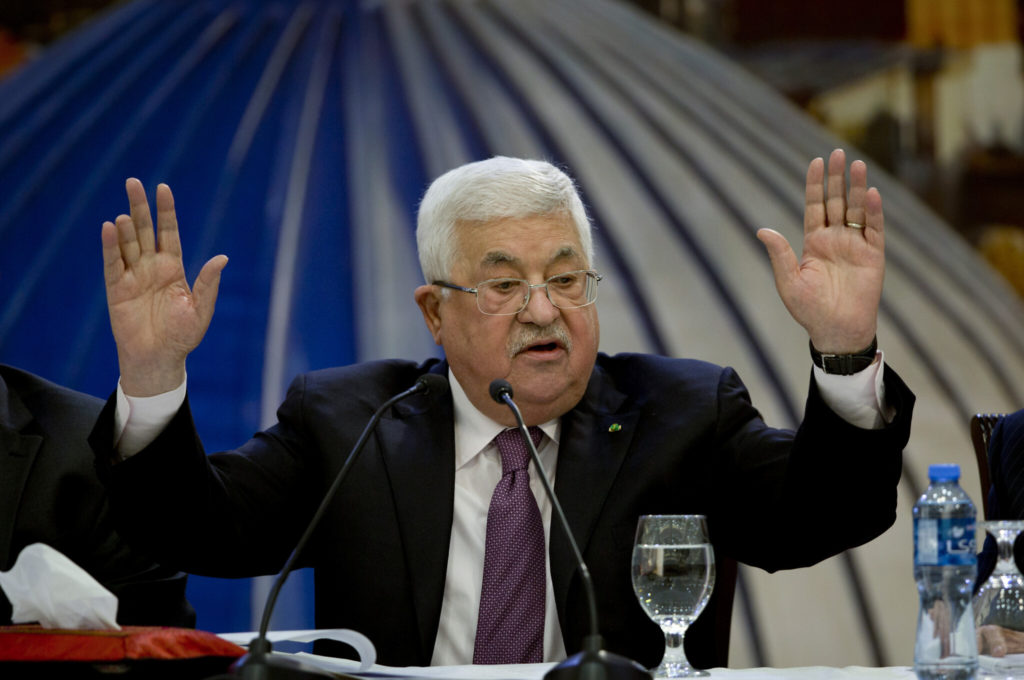IN THE MEDIA
Abbas’ role in stalling the peace process must not go ignored
June 17, 2020 | Allon Lee

Canberra Times – June 17 2020
As the longest-serving democratically elected leader of his people, one might have hoped he would not keep squandering so many opportunities to end the 100-year-old conflict that has bedevilled both his own society and population and the wider Middle East.
No, not Israeli Prime Minister Benjamin Netanyahu.
Rather, Palestinian Authority President Mahmoud Abbas – now in the 16th year of his initial four-year term.
Amid dire warnings that Netanyahu’s plan to extend Israeli sovereignty over parts of the West Bank will kill the two-state solution (including by Neheda Barakat on these pages on June 11), insufficient attention has been paid to Abbas’ dilatory leadership. It is this which, for all intents and purposes, effectively put such peace hopes into deep freeze long ago.
It was Abbas who reportedly encouraged Yasser Arafat to reject Israeli PM Ehud Barak’s offer at Camp David precisely 20 years ago.
Abbas biographer Grant Rumley notes that he was one of the “least-flexible members of the Palestinian delegation. It was a shocking revelation for American and Israeli negotiators”.
Succeeding Arafat following his death, Abbas won a landslide in the 2005 presidential elections.
But faced with his own two-state Rubicon in 2008, Abbas, as he himself put it, rejected “out of hand” Israeli prime minister Ehud Olmert’s offer of a state on the equivalent of 100 per cent of the West Bank, all of Gaza, and a capital in east Jerusalem.
Six months later, with US President Barack Obama determined to put “daylight” between his administration and Israel in the belief this would improve peace prospects, Netanyahu returned as PM after 10 years in the wilderness.
Netanyahu went to Bar Ilan University to endorse creating a Palestinian state as part of a negotiated settlement. At Obama’s insistence, Netanyahu then implemented an unprecedented 10-month-long settlement buildings freeze as a goodwill gesture.
Yet Abbas refused to negotiate until the final month and then only to insist on an extension of the freeze to keep talking.
It took another three years to restart peace talks.
Backed by the most pro-Palestinian US President in decades, Abbas went missing when presented with a US proposal designed to meet Palestinian demands.
US Secretary of State John Kerry explained in his memoir: “Obama met with Abbas in the Oval Office … the Palestinians continued to say they were studying the [US] proposal, but they never actually responded. It was clear that they were unwilling to make any concessions.”
Confirmation that Netanyahu took the talks seriously came from PLO peace talks adviser Hussein Agha in 2018, when he endorsed the diagnosis of US mediator Martin Indyk that, by March 2014, Netanyahu had “moved into the zone of a possible agreement”, while Abbas had “checked out of the negotiations”.
Since then, Abbas has refused to re-engage in any direct or indirect negotiations on a two-state outcome.
Moreover, in 2015, Abbas indulged in some pretty ugly incitement in vowing that he will not let the “filthy feet” of Jews desecrate Christian and Muslim holy sites in Jerusalem.
This brings us to the current situation.
Faced with a US administration intent on confronting the Palestinian Authority’s excesses and its stonewalling, Abbas has quickly dropped any pretence of playing the game.
He rejected Donald Trump’s insistence that US aid be conditional upon the Palestinian Authority no longer funding the “Pay for Slay” scheme, whereby generous ongoing financial support is given to Palestinians (and their families) who commit terrorism against Israelis.
He then boycotted the White House’s consultation process which led to the “Peace to Prosperity” plan – which nonetheless offers the Palestinians a state in Gaza, 70 per cent of the West Bank, Israeli land to compensate for the rest, and $US50 billion to kickstart the Palestinian economy.
Yet the plan also breaks from past models by enshrining the principle that there is a price to be paid for decades of rewarding terror and rejecting all proposed compromises – namely, that Israel’s security needs come first.
Netanyahu has accepted the plan and has the tacit support of Trump to begin unilaterally implementing elements of it, given the ongoing Palestinian refusal to even consider negotiating with Israel or the US.
Hence the talk about extending Israeli sovereignty over the strategically vital Jordan Valley and settlements.
Abbas is resorting to familiar tactics by denouncing any moves to extend Israeli sovereignty as ending any hopes for a two-state resolution.
We have no idea what, if anything, Netanyahu will do with regard to implementing Israeli sovereignty over parts of the West Bank assigned to it by the Trump peace plan, so there is currently no way to judge what effect such a move would have on long-term prospects of a two-state peace.
However, it is worth recalling that all serious peace plans over the past 30 years have envisaged Israel keeping at least some parts of the West Bank.
What we do know, though, is that, for the first time since Abbas checked out on Kerry in 2014, the Palestinian Authority is again hinting at reopening negotiations.
Palestinian Authority Prime Minister Mohammed Shtayyeh recently offered a counter-plan for the creation of a “sovereign Palestinian state” to the Middle East Quartet – the US, UN, EU and Russia – while Palestinian Authority Foreign Minister Riyad al-Maliki recently endorsed possible peace talks under Russian auspices.
Rather than killing a two-state peace, the Trump plan, and Israeli talk about implementing elements of it, may have shocked the frozen process out of stasis.
Allon Lee is a senior policy analyst at the Australia/Israel & Jewish Affairs Council.
Tags: Israel, Mahmoud Abbas, Palestinians





